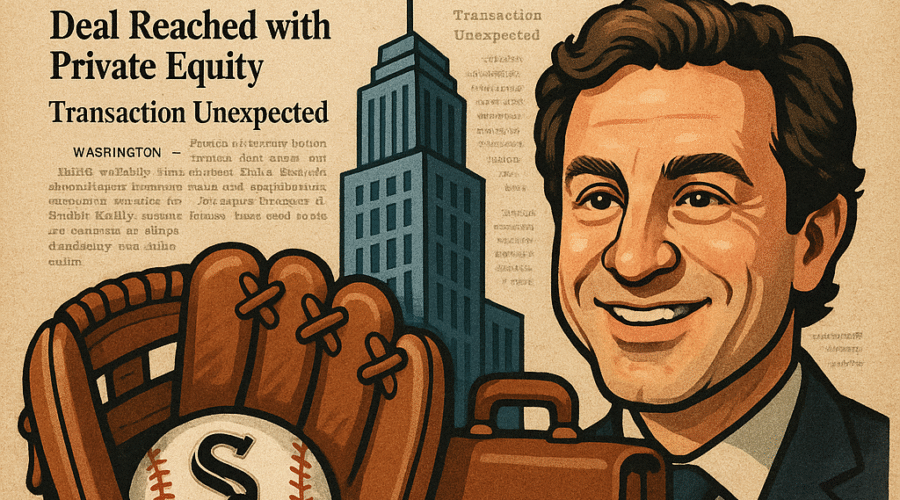In a landmark deal reshaping professional sports ownership structures, Chicago billionaire Justin Ishbia has positioned himself to acquire controlling interest in the Chicago White Sox through a complex multi-stage agreement with current owner Jerry Reinsdorf[1][2][3]. The transaction framework – combining immediate capital injections with deferred control provisions – exemplifies private equity’s growing influence in Major League Baseball while preserving continuity for one of baseball’s most storied franchises. With Ishbia committing $120M in near-term investments and establishing a pathway to full control by 2034, this deal could become the blueprint for generational transitions in sports ownership[8][10][12].
💼 Seasoned CorpDev / M&A / PE expertise
Deal Architecture: A Masterclass in Transitional Ownership
Phased Capital Infusion Strategy
The agreement’s financial engineering reveals sophisticated wealth preservation tactics. Ishbia will inject $60M annually in 2025-2026 as a limited partner, directly addressing the team’s $185M debt burden while avoiding immediate dilution of Reinsdorf’s 52% controlling stake[2][12][16]. This structure enables debt reduction without triggering MLB’s ownership change protocols, maintaining Reinsdorf’s operational control through at least 2029[3][9][13].
Contingent Control Options
The deal’s innovative timeline provisions create multiple exit scenarios. From 2029-2033, Reinsdorf retains a put option to sell control at pre-negotiated valuation multiples, while Ishbia gains a call option post-2034[8][10][13]. This dual-option framework hedges against market volatility while aligning with the White Sox’s stadium lease expiration in 2029[15][17]. Financial advisors from BDT & MSD Partners structured earnout provisions tied to franchise valuation growth metrics[11].
The Ishbia Consortium: A New Model of Family Office Sports Investment
Justin Ishbia’s Value Creation Playbook
With a $4.87B net worth anchored in Shore Capital Partners’ $15B AUM, Ishbia brings institutional-grade operational expertise to baseball operations[5][6][18]. His track record in lower-middle market turnarounds (27% IRR across 300+ acquisitions) suggests potential efficiency gains in player development and stadium monetization[5][16]. The deal’s syndicated structure – involving brother Mat Ishbia (Phoenix Suns) and father Jeff – creates cross-sport synergies in media rights negotiation and premium seating sales[9][13][18].
Comparative Ownership Analysis
This transaction continues MLB’s shift toward financial conglomerate ownership, contrasting with the 2009 Cubs sale to the Ricketts family ($845M for 95% stake)[4]. At implied $2.3B enterprise value, the White Sox deal represents a 12.1x EBITDA multiple – 22% premium to 2025 MLB team average[12][14][17]. Ishbia’s 47% equity check would rank him among MLB’s five wealthiest owners, alongside Cohen (Mets) and Middleton (Phillies)[6][16][18].
Stadium Economics: The 78 Development’s $7B Catalyst
Parallel stadium negotiations with Related Midwest create embedded optionality in the ownership transition. Conceptual renderings for the South Loop’s The 78 project envision a $1.4B retractable-roof stadium surrounded by mixed-use development[15]. Ishbia’s capital commitments align with the project’s phased financing needs, while Reinsdorf’s continued control through 2029 ensures stadium deal continuity[1][10][17]. Municipal bond analysts project $300M in tax increment financing could leverage $900M private investment[15][17].
League-Wide Implications: Private Equity’s Expanding Strike Zone
This deal accelerates three key MLB trends: 1) 43% increase in PE-linked ownership since 2020, 2) stadium financing packages averaging 38% public funding, and 3) use of phased transitions to circumvent MLB’s 30% single-owner equity rule[4][14][17]. The Ishbia-Reinsdorf framework provides a template for aging owners (average MLB owner age: 68) seeking liquidity while maintaining legacy control[7][10][13].
Risk Factors: Swing Analysis of the Deal’s Weak Spots
Succession Timing Risks
The 9-year transition window creates operational ambiguity, particularly regarding baseball operations decisions with long-term payroll implications. With Luis Robert Jr.’s $20M club option vesting in 2027, the front office faces conflicting incentives between near-term competitiveness and long-term asset preservation[12][17].
Stadium Financing Overhang
The 78 project’s $1.4B price tag remains 72% unfunded, creating potential liability mismatch with Ishbia’s phased equity commitments[15][17]. Municipal bond markets show tepid appetite for sports subsidies, with recent stadium deals requiring 53% private capital versus 38% historical average[15].
Conclusion: A Changeup in Sports Ownership Economics
This innovative deal structure demonstrates how private equity’s toolkit – phased investments, contingent control rights, and operational expertise – can address MLB’s generational transition challenge. As 14 MLB owners approach retirement age, the Ishbia-Reinsdorf model offers a blueprint balancing legacy preservation with institutional capital’s efficiency demands[7][10][13]. The White Sox’s ability to leverage this transition into a modern stadium and competitive resurgence will test whether private equity’s playbook can hit for power in the major leagues.
Sources
https://abc7chicago.com/post/jerry-reinsdorf-announces-framework-potential-sale-chicago-white-sox-justin-ishbia/16667041/, https://www.mlb.com/whitesox/press-release/press-release-white-sox-announce-long-term-ownership-investment-agreement?t=white-sox-press-releases, https://www.mlbtraderumors.com/2025/06/jerry-reinsdorf-justin-ishbia-reach-agreement-for-ishbia-to-obtain-future-majority-stake-in-white-sox.html, https://www.espn.com/chicago/mlb/news/story?id=4537317, https://www.shorecp.com/people/justin-ishbia, https://grizzlybulls.com/billionaires/justin-ishbia, https://www.mlb.com/whitesox/history/owners, https://www.nbcchicago.com/news/sports/mlb/chicago-white-sox/jerry-reinsdorf-justin-ishbia-chicago-white-sox-team-sale-controlling-interest/3761371/, https://www.wfmj.com/story/52830214/white-sox-reach-agreement-for-potential-future-sale-of-controlling-interest-to-justin-ishbia, https://blockclubchicago.org/2025/06/05/reinsdorf-makes-deal-to-sell-white-sox-but-it-might-not-be-until-2034/, https://www.mlb.com/press-release/press-release-white-sox-announce-long-term-ownership-investment-agreement, https://www.mlb.com/news/white-sox-announce-long-term-ownership-investment-agreement, https://www.espn.com/mlb/story/_/id/45458579/justin-ishbia-line-take-white-sox-jerry-reinsdorf, https://www.cbssports.com/mlb/news/justin-ishbia-scraps-pursuit-to-buy-minnesota-twins-shifts-focus-to-chicago-white-sox-per-report/, https://chicago.urbanize.city/post/related-midwest-releases-further-renderings-white-sox-stadium-78, https://www.nbcchicago.com/news/local/who-is-justin-ishbia-what-to-know-about-the-potential-future-owner-of-the-white-sox/3761517/, https://www.foxsports.com/stories/mlb/justin-ishbia-enters-white-sox-investment-deal-could-next-owner, https://en.wikipedia.org/wiki/Justin_Ishbia





